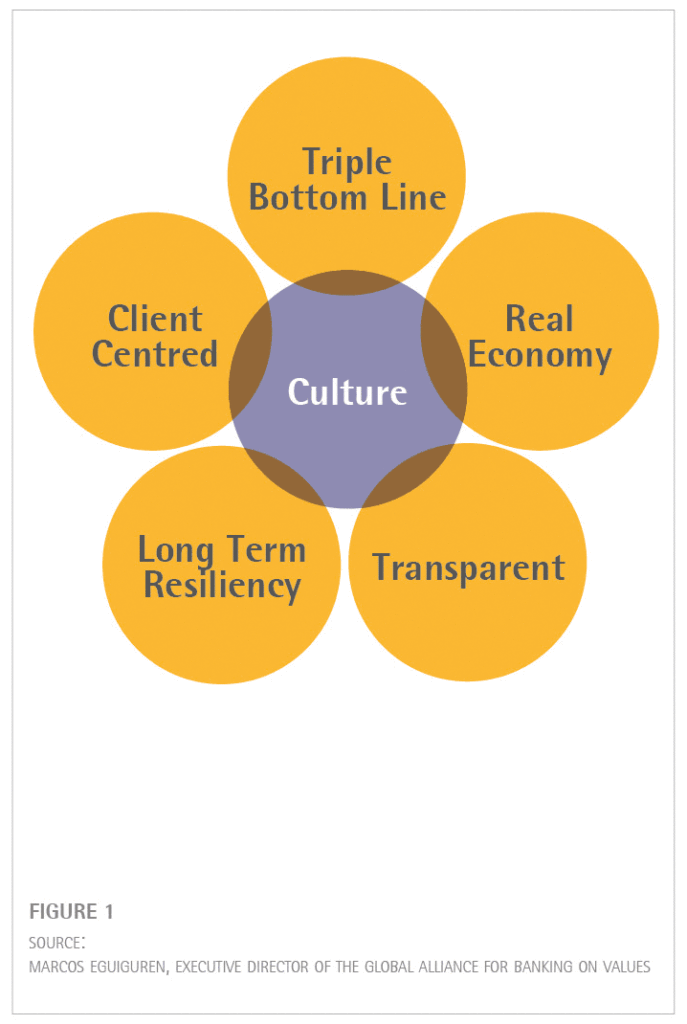
In our global world, international collaboration is developing very fast. Understanding national cultures in business is a key success factor in building international alliances. The banking sector is one of the most international services in our world, as we have experienced through the most recent worldwide financial crisis
There is a societal and human need to transform our financial institutions into a more sustainable and value driven business. Changing the way of banking is a huge challenge for bankers, governments and academics and this transformational challenge is closely connected with the CEMS Values:
– Pursuit of excellence with the highest standards of integrity, humility, and ethical conduct.
– Professional responsibility and accountability in relation to society and the environment.
– Drawing upon the value of cultural diversity with respect and empathy.
When we take the CEMS values seriously, the banking sector is one of the most important sectors that needs to evolve in order to create a better world. The banking sector is internationally organised and yet, at the same time, there are huge cultural differences between countries in this sector. We need to build transnational leaders with a deep understanding of country cultures and banking habits if we want to contribute to a fundamental change in our financial institutions.
Transnational leadership is a quality, more than a competence. It is related to the quality of life and the quality of our society. Transnational leaders have a worldwide view, are open-minded and willing to experiment with new behaviour. They are culturally sensitive and able to develop a deep understanding of guiding values in human interaction. They are socially aware and interested in the needs and values of people around them. And they know themselves and recognise what inspires and fascinates them. Maybe most important: they know where they come from and understand their own cultural values.
Banking is fascinating when we focus on cross-cultural management and global leadership because banking sector culture differs enormously across countries. Shareholder value is a main driver in the banking sector in the Western world with a short-term perspective on profit. Profit goes before people. In South-East Asia harmony and loyalty are important values. These values influence financial services in Asia. Islamic banking means that banking activities are consistent with the principles of the Sharia and the Sharia prohibits acceptance of specific interest or fees for loans of money and it does not allow speculations and unethical practices. In Islamic banking you are not allowed to make money out of money. In China the principle of Guanxi is important to understand banking activities. It is based on trust to people you know and distrust to strangers. Intermediaries are required to overcome mistrust. These examples make clear that it is impossible to speak about the banking sector culture in general, however building a culture of value based banking is starting to take hold.
Worldwide, the Global Alliance of Banking on Values (GABV) is one of the most remarkable initiatives by banks to change banking culture by putting people before profit and is based on values like transparency, long-term resilience, investing in real economy and long-term client relationships. It is a growing movement that influences the way people conduct business and create a living. Value based banking has to be profitable, otherwise it would not be sustainable in itself, but the glue lies within their values and principles.
Corporate culture and values
Figure 1- Corporate culture and management transparency are so relevant for the GABV that they have become core elements within the six principles that they use to evaluate and promote values-based banking.
1. Triple bottom line approach at the heart of the business model.
2. Grounded in communities, serving the real economy and enabling new business models to meet the needs of both.
3. Long-term relationships with clients and a direct understanding of their economic activities and the risks involved.
4. Long-term, self-sustaining, and resilient to outside disruptions.
5. Transparent and inclusive governance.
6. All of these principles embedded in the culture of the bank.

Sustainable banks seek to embed the six principles in the culture of their institutions so that they are routinely used in decision-making at all levels. Recognising that the process of embedding these values requires deliberate effort, these banks develop human resources policies that reflect their values-based approach (including innovative incentive and evaluation systems for staff), and develop stakeholderoriented practices to encourage sustainable business models. These banks also have specific reporting frameworks to demonstrate their financial and non- financial impact.
For Values based banks, the six principles are not just a nice-to-have statement hung on a wall. They can only succeed in being a values based organisation if the culture of the bank, starting with the CEO and the Board and embracing every single co-worker, is aligned with the six principles and inspires the policies, the procedures and the behaviours of every individual.
The GABV is an independent network of banks using finance to deliver sustainable development for people, communities and their environment. The alliance was founded in 2009 with a shared mission to use finance to deliver sustainable economic, social and environmental development. The alliance comprises 28 financial institutes operating across 31 countries in Asia, Africa, Australia, Latin America, North America and Europe, serving 20 million customers. The GABV provides learning and developing opportunities for senior executives, experts and talented professionals.
Recently, CEMS students collaborated with GABV as part of the Global Management Practice course, taught by Professor Boonstra at Esade.
This is what these students said about the course:
“My first impression was “ah yeah, sustainable banking, how is it possible? This guy doesn’t know what he is talking about, banking is the least attractive sector for sustainability”. However, by the end of the course I had changed my mind: we need to tackle the toughest sector if we want to see an impact on the overall economy and society!”
Arturo Villa Bocconi
University, Milan, Italy
“I heard in the past years various stories about certain irresponsible and careless behaviour of professionals working in the banking area. Therefore, I see the coming years as a real clarification phase for myself in terms of how my generation can change banking and how the whole market values develop.“
Christopher Brunert
Esade Business School, Barcelona, Spain
In the final session of the course, the students presented findings about cultural differences in banking around the world and shared ideas to develop the GABV as a movement to fundamentally change the banking sector. This was an exiting moment because the executive director of the GABV was there with a member of his advisory board, together with directors of ‘Corporate Identity’, ‘Strategy’, and ‘Marketing’ of Triodos Bank and directors ‘Risk Management’ and ‘Communications’ from Triodos Bank Spain. In the Western world Triodos Bank is an excellent example of a bank that pays attention to sustainability and the needs of customers and society. One of the most important insights from the discussions was that value based banking is possible all around the world, in almost every country, including Russia, China and India.
This is what these directors said about the contributions of the students:
“A group of 46 students with 22 nationalities took our breath that day. We had hoped for lots of positive energy and innovative insights – but it went through the roof. The quality was extremely high and all the positive energy opened up our minds. That day we had an excellent experience that really contributed to the movement of value based banking. It was so innovative that we decided to explore opportunities for further cooperation. With all that talent at hand, we didn’t miss out on the opportunity to ask these Millennials what it would take to get them interested in working in the banking industry. They open-heartedly framed it as “the five I’s”:
– Innovation
– International experience
– Impact for a better world
– Intrinsic values
– Interactions with people of different backgrounds”
“To put it simply, it is all about humanising your environment and making it personal”.
Yves Patoux
University of Economics, Prague, Czech Rep
